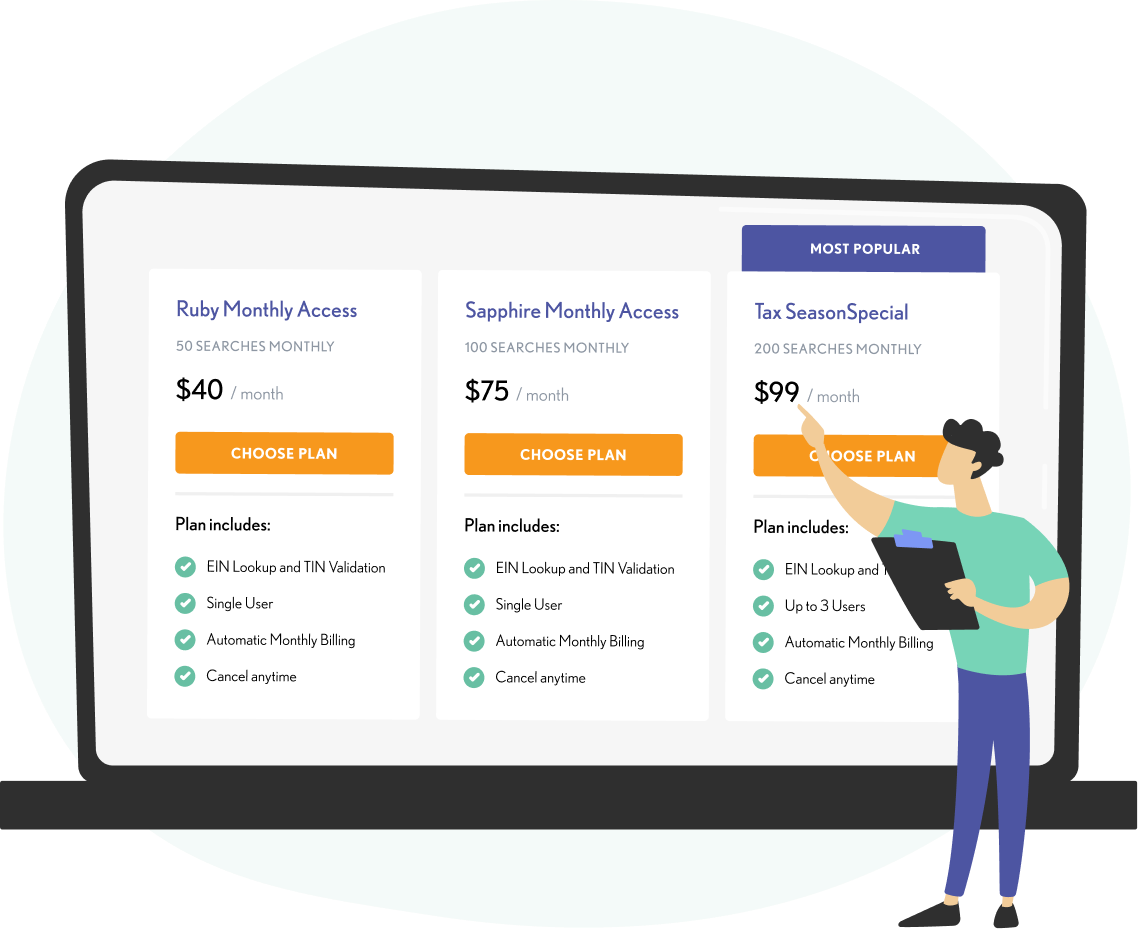TIN Matching
Get started for as little as $25.Avoid Penalties & Fraud with TIN Matching

What is TIN Matching / EIN Validation?
TIN (Taxpayer Identification Number) Matching, also known as EIN Validation, is an important step in the due diligence and KYC/KYB process. Not only does ensuring a TIN is correctly matched with an entity help validate the entity’s existence, but it mitigates the potential for fraud.
By using our TIN Matching and EIN Validation services, organizations can also reduce potential IRS penalties for incorrect information on filings such as a 1099.
Why choose EINsearch for your TIN Matching & Validation needs?
Whether verifying a vendor, issuing 1099s, opening accounts, or beginning business relationships, EINsearch can assist your organization in avoiding penalties and potential fraud through TIN Matching and EIN Verification.
Using a paid service like EINsearch allows you to take advantage of a well-organized, easy to use system providing real-time validation without hassle.

Hands-on Interactive TIN Matching
If you prefer a bit more of a hands-on approach, we provide our clients with both a GUI and API user experience. These solutions allow our clients to use our interactive TIN matching system to conduct their own searches. Plans are available to support all volume ranges and multi-user options are available.

How using a TIN Matching service can help your business
The IRS continues to raise penalties for including incorrect information on filings, such as Form 1099s.
Using our TIN Matching and EIN Verification services allows your organization to ensure the TIN and entity name provided match those with the IRS records.
Through our IRS TIN matching system and one of the largest verified EIN databases in the world, our clients can verify that both the provided entity name and the TIN not only match each other, but also match IRS records.
By ensuring the EIN and name combination provided is accurate and registered with the IRS, your team can spend valuable time focused on other aspects of the business relationship and due diligence process.
Our system is designed to provide results in a simple, easy-to-understand manner.
By presenting clients with a clear “yes” or “no” response, we eliminate the room for error of interpreting a series of complicated response codes and unnecessary information other services provide.
“We are a busy tax office and frequently need to secure an EIN in a prompt manner. I have tried several services and although they had results, the cost was prohibitive for a small business. EINsearch has resolved that. Not only is the information readily available, but it is very fairly priced. We are glad we found it! Thank you!”
“They help us validate our new customers when they come onboard. They are fast, easy to work with and provide updates whenever there are any issues with the IRS. Would recommend!”
If you have questions, please call us at 800-299-8280, email us or start a live chat.
FAQs
What are the different types of TINs?
A Tax Identification Number, or TIN, is issued by the IRS and comes in several different forms. One of the most common is the Social Security Number (SSN) issued by the Social Security Administration (SSA). An SSN is the only TIN that is not issued by the IRS. In contrast, An Employer Identification Number, or EIN, is distributed by the IRS and typically assigned to an entity such as a business, trust, or estate. An Individual Tax Identification Number (ITIN) is a tax processing number assigned to individuals that do not qualify for an SSN but may still have a U.S. tax obligation and therefore need a TIN.
What are TINs used for?
TINs are used for various reasons such as credit applications, opening a bank account, and other due diligence purposes. They are also used as an identifier (hence the name) for tax purposes. TINs are regularly submitted on IRS documents such as a W-9, 1099-MISC, 1099-patr, 1099-div or other information returns.
What happens when a business does not have accurate TIN information?
If the IRS discovers incorrect information, they will typically send a notification to the filer. It then becomes the responsibility of the filer to take action to correct the mistake or be subject to penalties and fines.
What is a CP2100 notice?
A CP2100 Notice is the method by which the IRS notifies a filer that information submitted to the IRS contains incorrect information. This notice provides the filer the details of what the IRS believes to be incorrect and the opportunity to remedy the filing.
What is A B-Notice?
If you are provided incorrect information on a 1099, a B-Notice can be submitted to the individual or entity that provided you incorrect information. In this notice, the person submitting incorrect information is informed of their need to provide corrected information or otherwise be subjected to a mandatory withholding on the payment they are to receive.
These notices become crucial should you need to defend yourself against an imposed penalty for incorrect or missing information on a tax filing.
